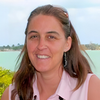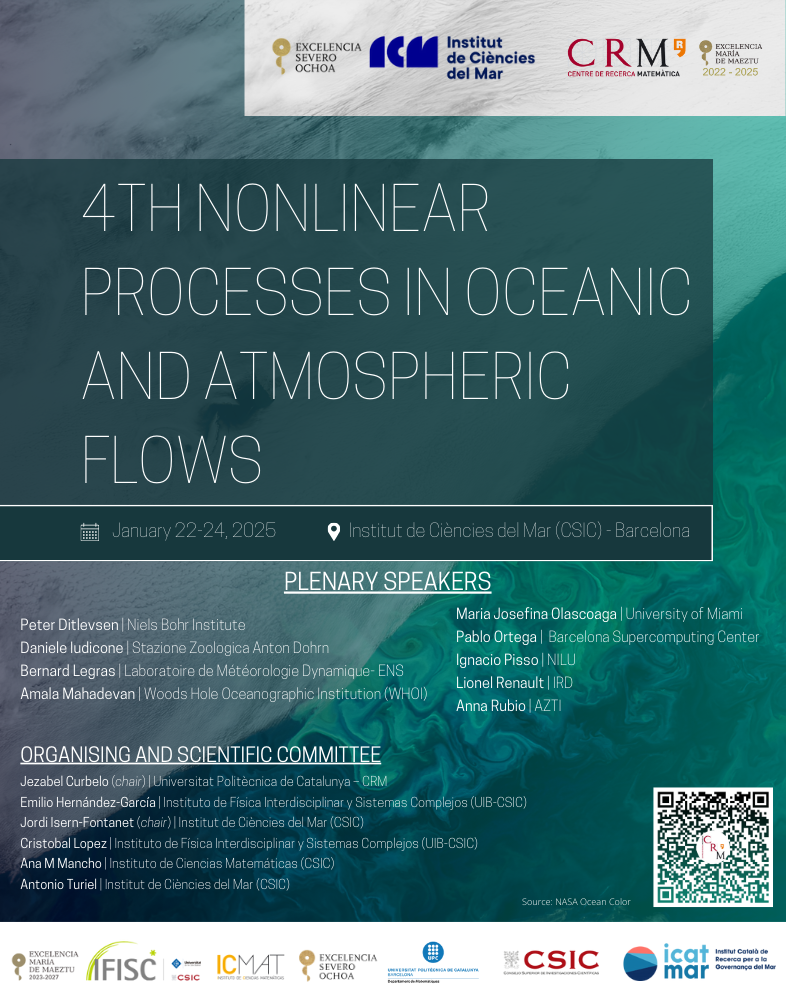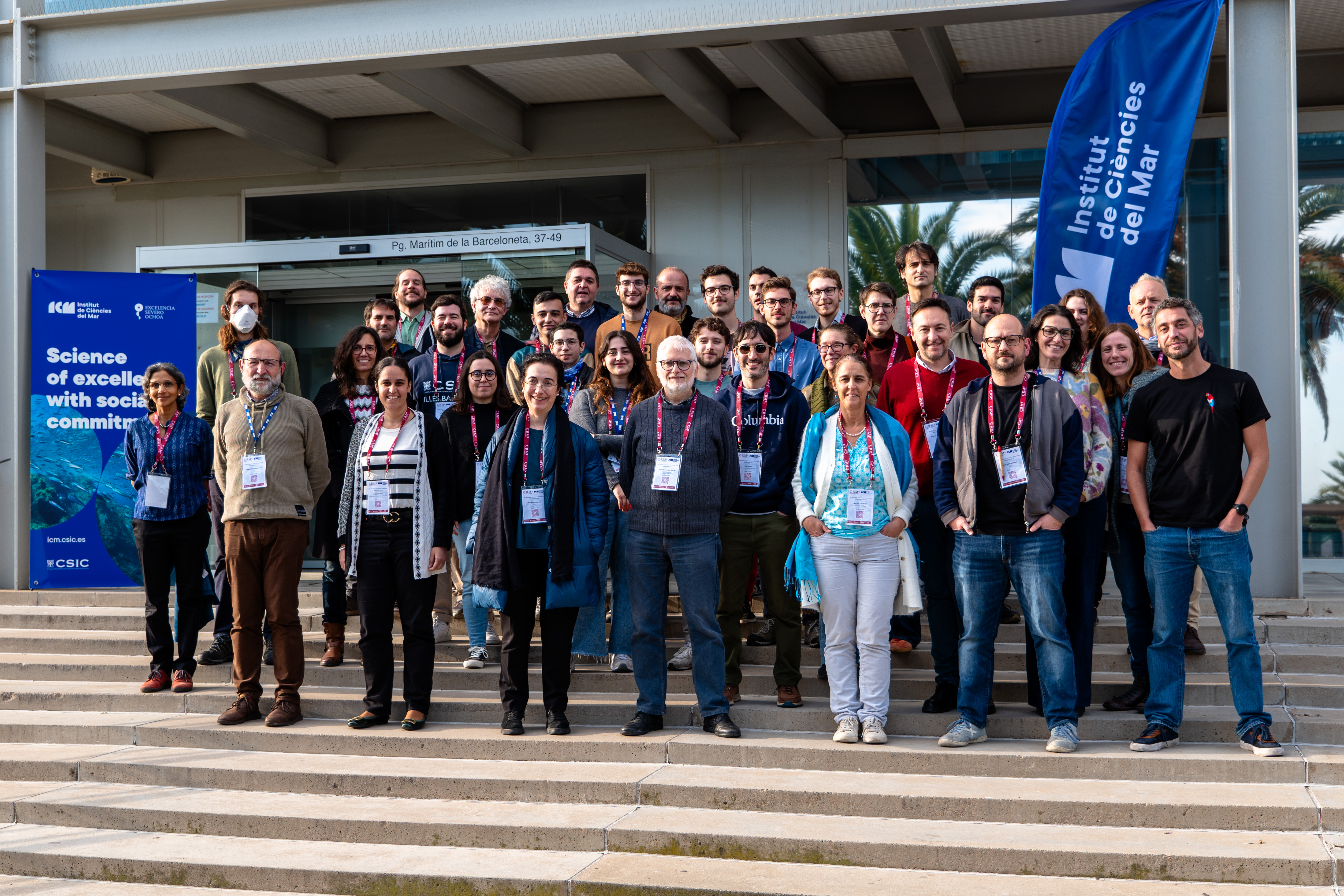4th Nonlinear Processes in Oceanic and Atmospheric Flows
Sign into January 24, 2025
Dates: January 22-24, 2025
Location: Institut de Ciències del Mar (CSIC)
REGISTRATION FEE
-
250€ Early Registration*
-
300€ Late Registration
-
Students:
-
190€ Early Registration*
-
220€ Late Registration
-
* Deadline for early registration: November 15th
Includes: Coffee break, lunch and a social dinner.
VENUE
The Institut de Ciències del Mar is located in Barcelona’s Villa Olimpica District between the Hospital del Mar and the Olympic Towers.
How to arrive:
- Bus: The end of the lines 59, 45, 92, 71 and V21 are a few meters from the ICM.
- Metro: The L4 line (yellow line) has a station (Ciutadella-Vila Olímpica) 300 metres from the ICM.
If you come from outside Barcelona arriving by:
- Train:
A) Ferrocarrils de la Generalitat Catalana FGCC: Get off at Plaça Catalunya station, and take the 59 bus or the underground.
B) RENFE: Get off at one of these stations: Sants Estació, Clot, Passeig de Gràcia. And take the underground L4 line (yellow line) to Ciutadella-Vila Olímpica station.
- Car: Use the Ronda del Litoral. Towards Besòs (north) take exit 21. Towards Llobregat (south) take exit 22.
- Airplane: Directly from the Airport one may take train, bus or taxi.
Photos
Introduction
• Castro Urdiales 2-4 Jul 2008, https://ifisc.uib-csic.es/public/nloa2008/
• ICMAT, Madrid 3-6 Jul 2012, https://ifisc.uib-csic.es/nloa2012/
• ICMAT, Madrid 6-8 Jul 2016, http://nloa2016.ifisc.uib-csic.es/
Plenary Speakers

Peter Ditlevsen
Niels Bohr Institute
I am a member of the Ice and Climate Group and associated with the Complexity Group.
My fields of interest are in climate research, turbulence, meteorology, complex systems, time series analysis and statistical physics.
Warning of a Forthcoming Collapse of the Atlantic Meridional Overturning Circulation
Personal Website

Daniele Iudicone
Stazione Zoologica Anton Dohrn
We combine experimental, numerical and theoretical tools using a fully multidisciplinary approach. This implies collaborating with molecular biology, bioinformatics and ecology teams. The research is supported by national and international programmes. Presently a large part of the research is made in the collaborative framework of the Tara Oceans project (http://www.embl.de/tara-oceans/start/).
The oceanic seascape and its microbiome
Personal Website

Bernard Legras
Laboratoire de Météorologie Dynamique- ENS
My scientific interests cover a wide range of topics in geophysical fluid dynamics, climate and on the composition of the atmosphere. The list of my past and present works span the statistical theory of turbulence in rotating fluids, the vortices in geophysical fluids, the synoptic weather regimes, the ozone chemistry, the transport and mixing in the atmosphere, the tropical convection, the impact of the volcanic and wildfire plumes. My works combine observation, modelling and theory. .
More on my research soon on a new dedicated page. In the mean time, look at my list of publications.
Dynamics of long-lived stratospheric rising aerosol vortices
Personal Website

Amala Mahadevan
Woods Hole Oceanographic Institution (WHOI)
Amala Mahadevan is a Senior Scientist at the Woods Hole Oceanographic Institution (WHOI) and faculty in the MIT/WHOI Joint Program in Oceanography. She earned a Ph.D. in Environmental Fluid Mechanics from Stanford University and was a postdoctoral associate at the University of Chicago. Her interests lie in exploring fluid dynamical processes that affect the oceanic carbon cycle and climate. She develops and uses computational models to study fluid instabilities, transport and mixing and has led several research expeditions to make measurements of the ocean on scales ranging from 1 to 100 km. By combining these observations with modeling, she aims to gain a deeper phenomenological understanding of ocean processes. Amala is a recipient of the Harvard Radcliffe fellowship in 2015, MIT’s Frank E. Perkins award for excellence in graduate advising in the School of Science in 2019, and the Arnold Arons award at WHOI for excellence in teaching, advising, and mentoring in 2020. She serves as Faculty Dean of an undergraduate house at Harvard University.
Coherent Pathways for the Vertical Transport of Organic Carbon and Oxygen in the Ocean
Personal Website

Maria Josefina Olascoaga
University of Miami
Olascoaga was born in Buenos Aires, Argentina, where she obtained a Licentiate in oceanography from Instituto Tecnológico de Buenos Aires (ITBA) in 1994. She then moved to Ensenada, Baja California, Mexico to pursue graduate education at Centro de Investigación Científica y de Educación Superior de Ensenada (CICESE). There she obtained a MSc degree (1996) under the direction of Professor Julio Sheinbaum and an ScD degree (2001) in physical oceanography under the advice of the late Professor Pedro Ripa. She subsequently moved to Miami to pursue postdoctoral training at RSMAS. She joined the RSMAS faculty in 2008.
Recent advances in the description of finite-sized buoyant particle dynamics in the surface ocean
Personal Website

Pablo Ortega
Barcelona Supercomputing Center
The role of the ocean mesoscale processes in shaping the future climate of the North Atlantic
Personal Website

Ignacio Pisso
NILU
Uncertainties in Lagrangian modeling of transport and mixing for atmospheric composition and emission flux assessment
Personal Website

Lionel Renault
IRD
Lionel Renault is a researcher at the French Institute for Research for Development (IRD), currently based at LEGOS in Toulouse. His research focuses on the analysis of submesoscale and mesoscale air-sea interactions, with particular emphasis on their impact on the overlying atmosphere and ocean dynamics. He studies the exchange of kinetic and potential energy between the atmosphere and the ocean, and how these interactions influence ocean dynamics, in particular the major ocean currents. A key aspect of his work is to understand the links between air-sea interactions and the oceanic cascade of energy, as well as the upscaling effects that these interactions have on large-scale oceanic features, including water masses, large-scale currents, and overall atmospheric circulation patterns.
Multi-scale Air-Sea Coupling: Direct impacts on the Atmosphere and the Ocean and Upscaling Effects
Personal Website

Anna Rubio
AZTI
Background on physical oceanography. My current research is mainly focused on the shelf-slope circulation and mesoscale activity in the Bay of Biscay. My work is mainly based on the analysis of in-situ Eulerian and Lagrangian measurements and remote sensing data, including high frequency observations of ocean surface currents from HF radars. She is currently head of Marine Technologies Area in the Marine Research Division, coordinating technological development, innovation and transfer to marine and maritime fields (Operational oceanography, Fisheries, Aquaculture, Transport, Ocean energy, Tourism).
Towards an integrated and multidisciplinary observational approach to (sub-)mesoscale coastal dynamics in the southeast Bay of Biscay
Personal Website
Organising and Scientific Committee
Jezabel Curbelo (chair) | Universitat Politècnica de Catalunya – CRM
Emilio Hernández-García | Instituto de Física Interdisciplinar y Sistemas Complejos (UIB-CSIC)
Jordi Isern-Fontanet (chair) | Institut de Ciències del Mar (CSIC)
Cristobal Lopez | Instituto de Física Interdisciplinar y Sistemas Complejos (UIB-CSIC)
Ana M Mancho | Instituto de Ciencias Matemáticas (CSIC)
Antonio Turiel | Institut de Ciències del Mar (CSIC)
SCHEDULE
Wednesday 22nd January, 2025 | Thursday 23rd January, 2025 | Friday 24th January, 2025 | |||
09:15 09:30 | Registration | 10:00 10:50 | Plenary talk Warning of a Forthcoming Collapse of the Atlantic Meridional Overturning Circulation Peter Ditlevsen | 09:30 10:20 |
Plenary talk The oceanic seascape and its microbiome |
09:30 10:00 | Welcome | 10:50 11:30 | Coffee Break | 10:20 11:10 | Plenary talk Towards an integrated and multidisciplinary observational approach to (sub-)mesoscale coastal dynamics in the southeast Bay of Biscay |
10:00 10:50 | Plenary talk The role of the ocean mesoscale processes in shaping the future climate of the North Atlantic
| 11:30 12:20 | Plenary talk Uncertainties in Lagrangian modeling of transport and mixing for atmospheric composition and emission flux assessment Ignacio Pisso | 11:10 11:50 | Coffee Break |
10:50 11:30 | Coffee Break | 12:20 13:35 | Contributed talks 1. K. Padberg-Gehle 2. F. Beron-Vera 3. A. Corral | 11:50 12:40 | Plenary talk Multi-scale Air-Sea Coupling: Direct impacts on the Atmosphere and the Ocean and Upscaling Effects |
11:30 12:20 | Plenary talk Dynamics of long-lived stratospheric rising aerosol vortices Bernard Legras | 13:35 15:00 | Lunch Break | 12:40 13:30 | Contributed talks 1. I. Hernandez-Carrasco 2. C. Gonzélez-Haro |
12:20 13:35 | Contributed talks 1. D. C. Morales 2. M. Ruiz- Villarreal 3. G. Meletti | 15:00 15:50 | Plenary talk Amala Mahadevan | 13:35 15:00 | Lunch Break |
13:35 15:00 | Lunch Break | 15:50 16:00 | 📸 Group Photo | 15:00 16:15 | Contributed talks 1. J. Martinez 2. J. Gancio 3. A. Turiel |
15:00 15:50 | Plenary talk Recent advances in the description of finite-sized buoyant particle dynamics in the surface ocean Maria Josefina Olascoaga | 16:00 16:45 | Contributed talks 1. S. Campagnola 2. R. Iacometti | 16:15 16:30 | Closing Session |
15:50 17:05 | Contributed talks 1. C. Masoller 2. T. Bodin 3. E. Ser-Giacomi | 16:45 18:00 | Poster Session + Wine & Cheese | ||
20:30- | Dinner at Cal Boter restaurant | ||||
ABSTRACTS CONTRIBUTED TALKS & POSTERS
CONTRIBUTIONS
Participants have the option to contribute with an oral or a poster presentation. The poster boards available at ICM are A0 format (vertical orientation).
To apply, please select the relevant option during the registration process and follow the template provided below.
- Deadline for oral presentation submission: December 5th, 2024.
- Deadline for poster presentation submission: January 8th, 2025.
Abstract Template (ZIP with PDF and .TEX files)
LIST OF PARTICIPANTS
| Name | Institution |
|---|---|
| Emilio Hernandez-Garcia | IFISC (CSIC-UIB) |
| Savitri Galiana | Institut de Ciències del Mar, CSIC |
| Diego Cortés Morales | IMEDEA (CSIC-UIB) |
| Ismael Hernandez-Carrasco | IMEDEA (CSIC-UIB) |
| Thomas Bodin | ICM (CSIC) |
| Kathrin Padberg-Gehle | Leuphana University Lüneburg |
| Cristina González-Haro | ICM-CSIC, ICATMAR |
| Ignacio Pisso | NILU |
| Natasa Dragovic | University of Saint Thomas |
| Peter Ditlevsen | Niels Bohr Institute |
| Amala Mahadevan | Woods Hole Oceanographic Institution |
| Daniele Iudicone | Statione Zoologica Anton Dohrn |
| Lionel Renault | Institut de Recherche pour le Développement |
| Pablo Ortega | Barcelona Supercomputing Center |
| ANNA RUBIO | AZTI |
| Clara Casals i Baixas | Institut de Ciencies del Mar (ICM - CSIC) |
| Antonio Turiel | Institute of Marine Sciences, CSIC |
| Arnau Comas | Universitat de Barcelona |
| Giulio Tirabassi | Universitat Politècnica de Catalunya |
| cris MASOLLER | Universitat Politècnica de Catalunya |
| Juan Gancio | Universitat Politècnica de Catalunya |
| Viktor González Gea | Universitat Politècnica de Catalunya |
| Jezabel Curbelo | Universitat Politècnica de Catalunya |
| Gabriel Meletti | Universitat Politècnica de Catalunya |
| Marc Calvo Schwarzwalder | Universitat Politècnica de Catalunya |
| Cristobal Lopez | Universitat de Les Illes Balears |
| Stefano Campagnola | Universitat de Les Illes Balears |
| enrico ser-giacomi | Universitat de Les Illes Balears |
| Victor Rodriguez-Mendez | Universitat de Les Illes Balears |
| Luis Álamo Rodríguez | Universidad de Granada |
| Marin Belamaric | University of Zagreb |
| Bernard Legras | École normale supérieure - Paris |
| Riccardo Iacometti | Sapienza University of Rome |
| Giovanni Dematteis | University of Turin |
| FRANCISCO BERON-VERA | University of Miami |
| M. Josefina Olascoaga | University of Miami |
| Alvaro Corral | Centre de Recerca Matemàtica |
| Ana Maria Mancho | CSIC |
| Jordi Isern-Fontanet | CSIC |
| Sofía González Pérez | CSIC |
| Manuel Ruiz Villarreal | CSIC |
| David Molina | CSIC |
| Jaume Garcia Theatre | CSIC |
| Lucía Quirós-Collazos | CSIC |
| Rubèn Martí | CSIC |
INVOICE/PAYMENT INFORMATION
IF YOUR INSTITUTION COVERS YOUR REGISTRATION FEE: Please note that, in case your institution is paying for the registration via bank transfer, you will have to indicate your institution details and choose “Transfer” as the payment method at the end of the process.
UPF | UB | UPC | UAB
*If the paying institution is the UPF / UB/ UPC / UAB, after registering, please send an email to comptabilitat@crm.cat with your name and the institution internal reference number that we will need to issue the electronic invoice. Please, send us the Project code covering the registration if needed.
Paying by credit card
IF YOU PAY VIA CREDIT CARD but you need to provide the invoice to your institution to be reimbursed, please note that we will also need you to send an email to comptabilitat@crm.cat providing the internal reference number given by your institution and the code of the Project covering the registration (if necessary).
LODGING INFORMATION
BARCELONA & THE METROPOLITAN AREA
|
For inquiries about this event please contact the Scientific Events Coordinator Ms. Núria Hernández at nhernandez@crm.cat
|
Abstract
Oceanic phytoplankton play a crucial role in regulating atmospheric CO₂ and Earth’s climate through the production of particulate organic carbon (POC) and oxygen. This seminar will explore the mechanisms and pathways through which microbial carbon and oxygen, generated in the sunlit surface waters, are transported to the ocean’s interior. We will focus on submesoscale processes that disrupt geostrophic balance and induce downwelling, which in turn subducts surface waters into deeper layers. Using flow fields from a high-resolution three-dimensional ocean model, we trace these pathways and identify coherent intrusions of water that transport surface-originated properties to depth. In particular, we highlight evidence from the Mediterranean Sea of such subsurface intrusions, demonstrating the three-dimensional, coherent advection of microbial carbon and oxygen. These findings challenge conventional general circulation models, which typically fail to resolve these processes. Understanding these pathways is essential for improving global carbon export estimates and understanding the ocean’s role in climate regulation.
Abstract
In this talk, I will explore the extent to which fine-scale air-sea interactions influence both the low-level atmosphere and ocean dynamics. In particular, I will examine two key interactions: the thermal feedback (TFB), which describes the influence of sea surface temperature anomalies and gradients on the atmosphere, and the current feedback (CFB), which refers to the influence of surface ocean currents on the overlying atmosphere. I will first analyze the direct effects of TFB and CFB on the atmosphere and ocean dynamics at the oceanic mesoscale (O(100 km)) and submesoscale (O(1-10 km)), highlighting how they modulate the exchange of kinetic and potential energy between the ocean and the atmosphere. I will then discuss how mesoscale CFB can lead to upscaling effects that influence large-scale ocean currents, water masses, precipitation patterns, and extratropical storm tracks.
Abstract
Euskoos, the coastal observatory of the southeast Bay of Biscay, has been operational for over 15 years, collecting data on various physical variables in the region. Recent initiatives aim to enhance the capabilities of this observatory by developing an improved multidisciplinary observatory, better equipped to address critical needs related to the sustainable management of this coastal area, and the challenges related to global change. Among the available observation infrastructures in the region are a high-frequency radar system, a network of buoys, coastal and videometry stations, as well as two gliders and two autonomous surface vehicles equipped with biogeochemical and biological sensors. These technologies, sometimes combined with satellite data, allow for detailed study of small-scale coastal variability and its role in modulating transport and biogeochemical and biological cycles. In this presentation, I will show some recent examples of research conducted using data from this observatory, particularly on Lagrangian convergence structures in the coastal zone and their impact on various issues.
























